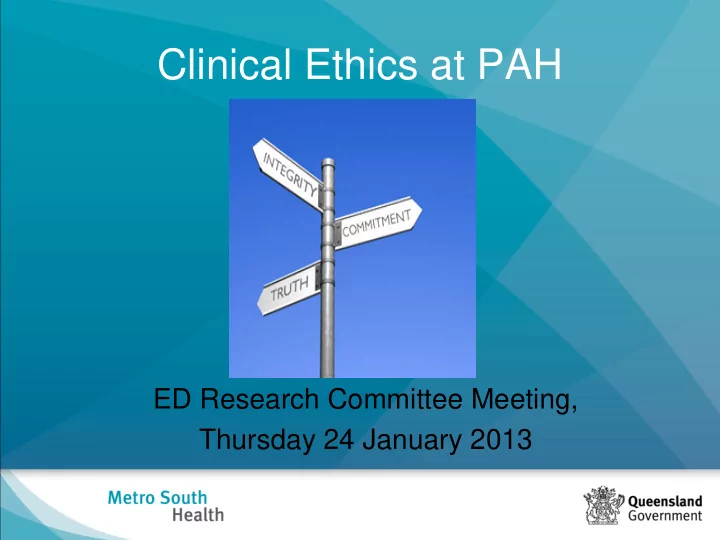

Clinical Ethics at PAH ED Research Committee Meeting, Thursday 24 January 2013
Who am I? PAH Clinical Ethics Service • A/Clinical Ethics Coordinator— Jennifer (Jenny) Jones, PhD, BA. • Jennifer_Jones2@health.qld.gov.au • 3176 7335 or 0417 435 606 • http://paweb.sth.health.qld.gov.au/ethics/default.asp
Bioethics, Clinical Ethics, Research Ethics • Bioethics – concerns ethical and moral issues associated with medical research and practice • Clinical ethics – concerns ‘the consideration of ethical issues arising directly in the context of patient care’ (Kerridge, Lowe and Stewart, 2009: 104). • Research ethics – aims ‘at ensuring the protection of participants in research’ (Kerridge, Lowe and Stewart, 2009: 104)
What is ethics? • Ethics is often perceived in terms of a Code of Ethics or set of moral principles guiding right action in relation to “what one ought to do?” • Often associated with the “big” dilemmas in life • Often spoken of in terms of “means” and “ends”
Ethics is not! • It is NOT a formula that sits on the sidelines waiting for those big dilemmas to enter our lives • Nor is it merely a NEAF which we “tick and flick” to the HREC for Ethics approval!
So, what is ethics? • Ethics is an ongoing process which ultimately concerns how we live our lives “We are discussing no small matter, but how we ought to live….” Socrates in Plato’s Republic • And how we live our lives ultimately concerns considerations of ‘“how ought we respond?” where the “we” is inclusive of all significant stakeholders, and the proposed outcome might evoke or demand a complex range of practical responses” (Isaacs & Massey, 1994: 2) • And how we respond ultimately concerns the ways we use our power…for instance, over others, against others, for others or with others, (Rollo May, 1972)
In the worlds we live in In law and justice issues WHERE IS In the decisions we and others In our relationships with ‘ETHICS’ make others FOUND? In people In policies and procedures In the dilemmas we encounter in living our lives
How are our ethics formed and informed or how have we learned socially accepted and expected ways of being and responding ethically? • Culture • History • Language • Politics • Lived experiences • Professional norms •The moral values embedded in these aspects of our lives shape and guide our individual ethical values. We project ourselves forward in our lives according to these values and we inject these values into our daily interactions with others.
Does “being ethical” matter? YES! ”being ethical” matters because it concerns human flourishing and human wellbeing!!
Why does “being ethical” matter? • Human beings are vulnerable beings • Human relationships are fragile • Human life is fragile • Our shared vulnerability makes “being ethical” INESCAPABLE!
Navigating our vulnerability Navigating our way through our worlds sometimes feels like walking a tightrope! Being ethical matters because – it concerns how we respond to our own, and others’, vulnerability
So, what does it mean to be ethical? • “being ethical” involves being aware of where you stand and what you stand for in the moral topography of your life (Charles Taylor, 1989). • To be ethical is to be aware of your values and how these values guide and, at times, challenge your ability to communicate and work effectively with others, both your patients and your colleagues. • Being ethical ultimately concerns being aware of how you use your power to enable (empower) yourself and others or dis-able (dis-empower) yourself and others!
Ethics in an organisational context • What would make an organisation and the people in it “ethical”? • And, how has PAH responded?
Clinical Ethics in Metro South Capacity—support—environment capacity—support—environment
Clinical Ethics at PAH Clinical Ethics Clinical Ethics Service Committee Clinical Ethics Coordinator
The role of the Clinical Ethics Committee ‘educational and advisory in purpose. Generally, the function of the ethics committee should be to consider and assist in resolving unusual, complicated ethical problems involving issues that affect the care and treatment of patients within the health care institution. Recommendations of the ethics committee should impose no obligation for acceptance on the part of the institution, its governing board, medical staff, attending physicians, or other persons. However, it should be expected that the recommendations of a dedicated ethics committee will receive serious consideration by decision makers’ (Kerridge et al., 2009: 106 citing American Medical Association, 2002)
Metro South Hospital and Health Values Caring for People, Leadership, Respect, Integrity, PAH Clinical Council Metro South Clinical Ethics Committee (Chair - A/Prof Frank Varghese) Princess Alexandra Clinical Ethics Service Acting Clinical Ethics Coordinator Dr Jennifer (Jenny) Jones EVERYDAY ETHICS 3176 7335 or Jennifer_Jones2@health.qld.gov.au http://paweb.sth.health.qld.gov.au/ethics/default.asp 2. ETHICS 3. POLICY REVIEW AND CONSULTATION 1. ETHICS EDUCATION SUPPORT and (guide appropriate • CLINICAL/ ACUTE RESEARCH organisational • INDIVIDUAL STAFF (capacity building) environment) (practical support)
Clinical Ethics in PAH Ethics Seminars, Cafés & Research (capacity building) Policy Ethics Review Consultations & (guiding an appropriate Support organisational (practical support) environment)
PA’s Clinical Ethics Service Who can use the service? • Any staff member – medical, nursing or allied health professional How do you refer a case? Or make a suggestion for an Education Seminar or Café? Or to arrange an “ethics” workshop? • Telephone: 3176 7335 or 0417 435 606 • Email: Jennifer_Jones2@health.qld.gov.au
PA’s Clinical Ethics Service Any questions? Thank you!
Metro South Clinical Ethics Service invites all Health Practitioners and interested persons to “Talk about dying in the 21 st century” with special guest Dr Peter Saul, Intensivist, John Hunter Hospital, Newcastle, NSW When: Thursday February 21st, 12noon -1.30pm BYO Lunch from 11.30am, (Tea and Coffee available) Where: Russell Strong Auditorium, PAH. Inquiries to: Dr Jenny Jones Jennifer_Jones2@health.qld.gov.au (0417 435 606) RSVP : Elaine_Wright@health.qld.gov.au Videoconferencing available: Bookings close – 15 th February Please join us at this lunchtime discussion forum aimed at raising awareness of the ethical sensitivities associated with the process of dying.
Recommend
More recommend